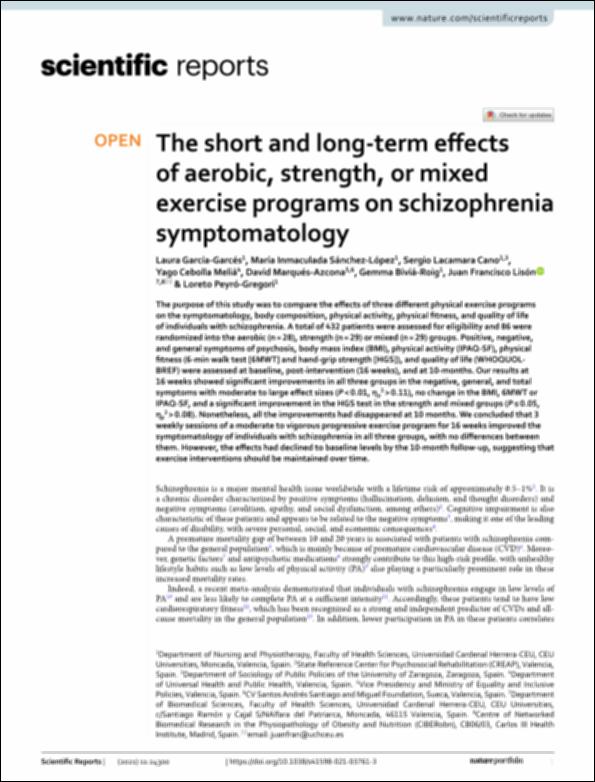Please use this identifier to cite or link to this item:
http://hdl.handle.net/10637/13595The short and long-term effects of aerobic, strength, or mixed exercise programs on schizophrenia symptomatology
| Title: | The short and long-term effects of aerobic, strength, or mixed exercise programs on schizophrenia symptomatology |
| Authors : | García Garcés, Laura Sánchez López, María Inmaculada Lacamara Cano, Sergio Cebolla Meliá, Yago Márques Azcona, David Biviá Roig, Gemma Lisón Párraga, Juan Francisco Peyró Gregori, María Loreto |
| Keywords: | Esquizofrenia - Tratamiento.; Schizophrenia - Treatment.; Ejercicio físico - Uso terapéutico.; Exercise - Therapeutic use. |
| Publisher: | Nature Research |
| Citation: | García-Garcés, L., Sánchez-López, M.I., Lacamara-Cano, S., Cebolla-Meliá, Y., Marqués-Azcona, D. Biviá-Roig, G. et al. (2021). The short and long-term effects of aerobic, strength, or mixed exercise programs on schizophrenia symptomatology. Scientific Reports, vol. 11, art. 24300 (21 dec.). DOI: https://doi.org/10.1038/s41598-021-03761-3 |
| Abstract: | The purpose of this study was to compare the effects of three different physical exercise programs on the symptomatology, body composition, physical activity, physical fitness, and quality of life of individuals with schizophrenia. A total of 432 patients were assessed for eligibility and 86 were randomized into the aerobic (n = 28), strength (n = 29) or mixed (n = 29) groups. Positive, negative, and general symptoms of psychosis, body mass index (BMI), physical activity (IPAQ-SF), physical fitness (6-min walk test [6MWT] and hand-grip strength [HGS]), and quality of life (WHOQUOLBREF) were assessed at baseline, post-intervention (16 weeks), and at 10-months. Our results at 16 weeks showed significant improvements in all three groups in the negative, general, and total symptoms with moderate to large effect sizes (P < 0.01, ηp 2 > 0.11), no change in the BMI, 6MWT or IPAQ-SF, and a significant improvement in the HGS test in the strength and mixed groups (P ≤ 0.05, ηp 2 > 0.08). Nonetheless, all the improvements had disappeared at 10 months. We concluded that 3 weekly sessions of a moderate to vigorous progressive exercise program for 16 weeks improved the symptomatology of individuals with schizophrenia in all three groups, with no differences between them. However, the effects had declined to baseline levels by the 10-month follow-up, suggesting that exercise interventions should be maintained over time. |
| Description: | Este artículo se encuentra disponible en la siguiente URL: https://www.nature.com/articles/s41598-021-03761-3.pdf |
| URI: | http://hdl.handle.net/10637/13595 |
| Rights : | http://creativecommons.org/licenses/by/4.0/deed.es |
| ISSN: | 2045-2322 (Electrónico) |
| Issue Date: | 21-Dec-2021 |
| Center : | Universidad Cardenal Herrera-CEU |
| Appears in Collections: | Dpto. Enfermería y Fisioterapia |
Items in DSpace are protected by copyright, with all rights reserved, unless otherwise indicated.


